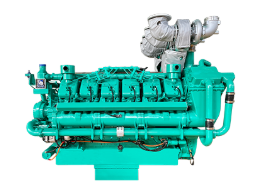Diesel Engine
Generator Set
In cold weather conditions, the starting performance of gas engines can be affected by various factors.
Firstly, low temperatures can cause changes in the physical properties of gas. Gas will increase in density and decrease in fluidity in low-temperature environments. This is like cooking oil becoming viscous in cold winter. When gas becomes viscous, its flow resistance in the intake pipe and injection system will increase. For gas engines that use injection gas supply, it is difficult for gas to enter the combustion chamber at the normal injection amount and injection speed, resulting in insufficient formation of the mixture. The mixture is the foundation of engine combustion work, and insufficient mixture can make it difficult or even impossible to start the engine.

Secondly, low temperatures can affect the performance of batteries. The starting of a gas engine relies on a starter motor, which is powered by a battery. In cold weather, the viscosity of the battery electrolyte increases and the chemical reaction rate slows down. This will result in a decrease in the output power of the battery and a reduction in the amount of electrical energy provided. If the starter motor does not receive enough electrical energy, the engine speed will decrease and it will not be able to drive the engine to reach the normal starting speed. Just like a person on a cold morning, their body becomes sluggish and their strength decreases.
Furthermore, engine oil can also thicken at low temperatures. The various moving parts inside the gas engine require oil for lubrication. When the engine oil thickens, its fluidity decreases and the frictional resistance between components increases. This will require key components such as the crankshaft and piston of the engine to overcome greater resistance during start-up, further increasing the difficulty of starting. Moreover, in this situation, the oil cannot reach various lubrication parts in a timely and effective manner, which may also lead to increased component wear.
In addition, cold weather can also cause the cylinder block temperature of the engine to be too low. Gas combustion requires a certain initial temperature condition, and a too low cylinder temperature is not conducive to the combustion of the mixture. Even if the mixture can enter the combustion chamber and be ignited, due to the low temperature of the cylinder block, the heat generated by combustion will be greatly absorbed by the cylinder block, resulting in unstable combustion process and engine shaking or even stalling. In order to improve the starting performance of gas engines in cold weather, measures such as heating the intake system, using high-performance low-temperature batteries, using low viscosity winter engine oil, and preheating the engine before starting can be taken.